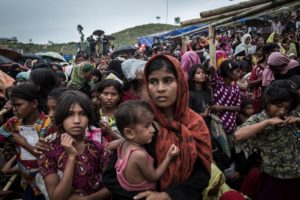Today, January 23, marks a momentous day in the Rohingya cause, as the International Court of Justice in The Hague ordered the government of Myanmar to take immediate steps to prevent genocide. The highest United Nations court unanimously adopted four legally binding provisional measures that require Myanmar to (1) prevent future genocidal acts, (2) ensure military and police forces do not commit genocidal acts, (3) preserve all evidence of genocidal acts, and (4) report regularly to the Court on compliance with these provisional measures. The measures are also automatically transmitted to the UN Security Council, which will be responsible for ensuring their implementation.
This is a landmark victory for Rohingya the world over. Global justice efforts such as these are more important than ever, as hundreds of thousands of Rohingya are still under the threat of genocide inside Myanmar, with many other minority groups inside Myanmar subjected to various forms of persecution and rights deprivation that could easily rise to mass atrocity levels. It speaks to the important linkage between international justice and genocide prevention, demonstrating how rule of law can be wielded to deter future atrocities against innocent people, simply because of who they are or what they believe.

Myanmar State Counsellor Aung San Suu Kyi
Today’s decision also marks a stunning rebuke of disgraced Nobel Peace Prize Laureate and Myanmar State Counsellor Aung San Suu Kyi, who traveled to the Hague in December to vehemently deny any allegations and evidence of genocide against the Rohingya.
Myanmar now will be hard-pressed to continue its rights-effacing policies without great international scrutiny. The more than 1 million Rohingya living in squalid camps in Bangladesh, as well as the hundreds of thousands trapped in a dehumanizing apartheid system inside Myanmar, have finally received a clear message that the world will not stand idly by in the face of their profound suffering. We must harness this immense momentum to ensure that the opportunity opened by this ICJ decision is fully seized for the purpose of acknowledging what the Rohingya have endured, protecting them from further abuses, and reinstating their identity and dignity.
Jewish World Watch stands in celebration with our Rohingya brothers and sisters, including the Rohingya diaspora community with whom we’ve partnered for years in advocacy efforts aimed at securing accountability for the atrocities perpetrated against their people. We call upon the countries of the world to uphold their moral, political, and legal obligation to ensure the provisional measures ordered by the Court are fully enforced. The Genocide Convention has reached the level of customary international law, which means that even countries who are not parties to the treaty are obligated to abide by it, including by preventing and punishing the crime of genocide.
Following evidence that the Myanmar military, known as the Tatmadaw, led a crackdown campaign in August 2017 of massacres, mass rape, and mass arson that displaced more than 800,000 Rohingya civilians to neighboring Bangladesh, the West-African country The Gambia opened a case against Myanmar at the ICJ for failing to prevent or punish genocide against the Rohingya Muslim minority of Rakhine State. On December 10, in its request for provisional measures, The Gambia presented evidence on the ongoing genocide against the Rohingya, citing the findings of the UN-backed Independent International Fact-Finding Mission on Myanmar, which reported in September 2019 that the more than 600,000 Rohingya remaining inside Myanmar “may face a greater threat of genocide than ever.”


